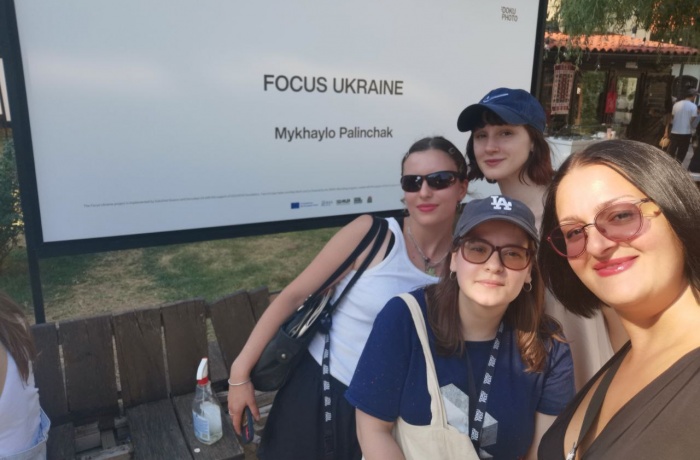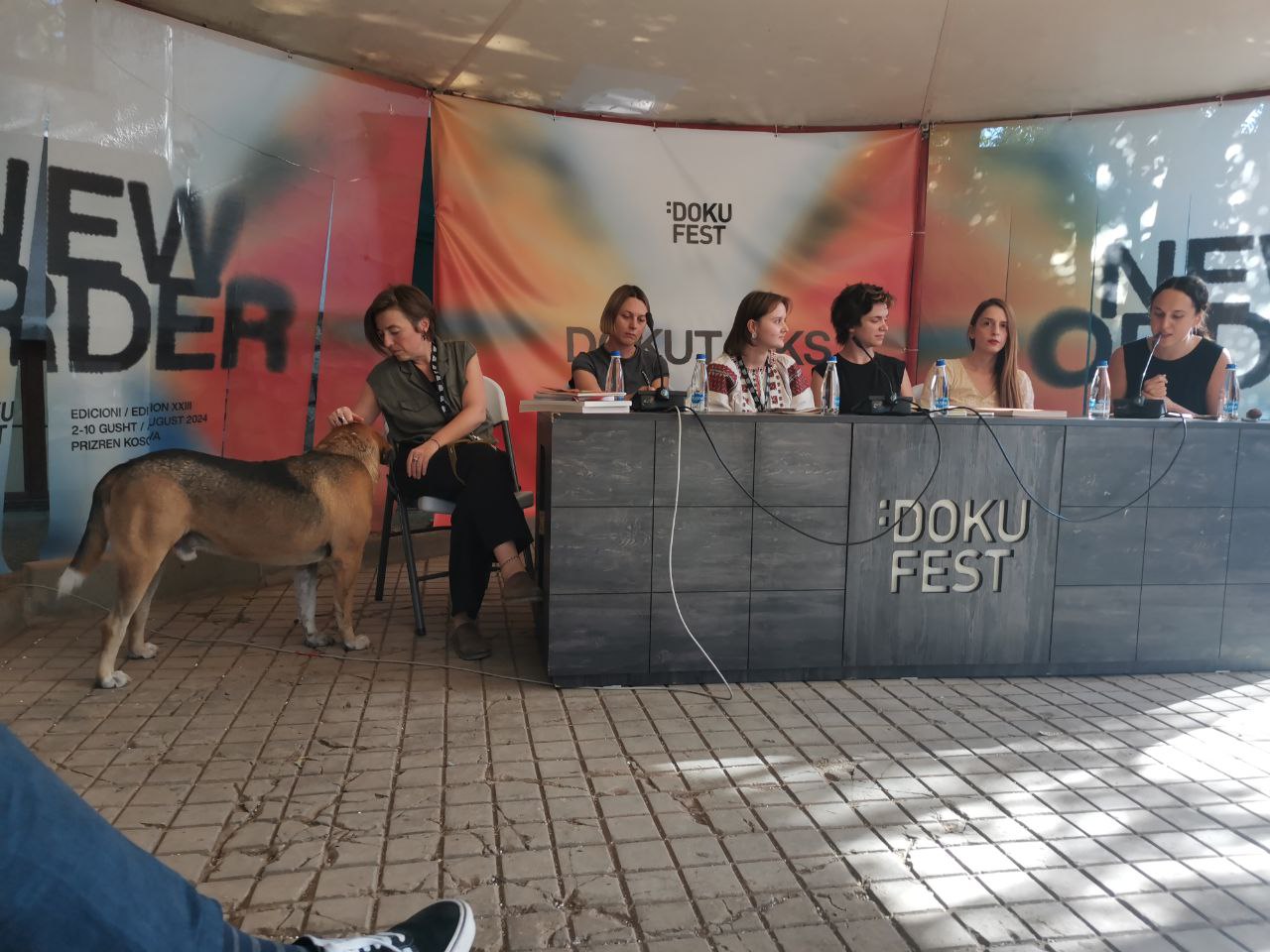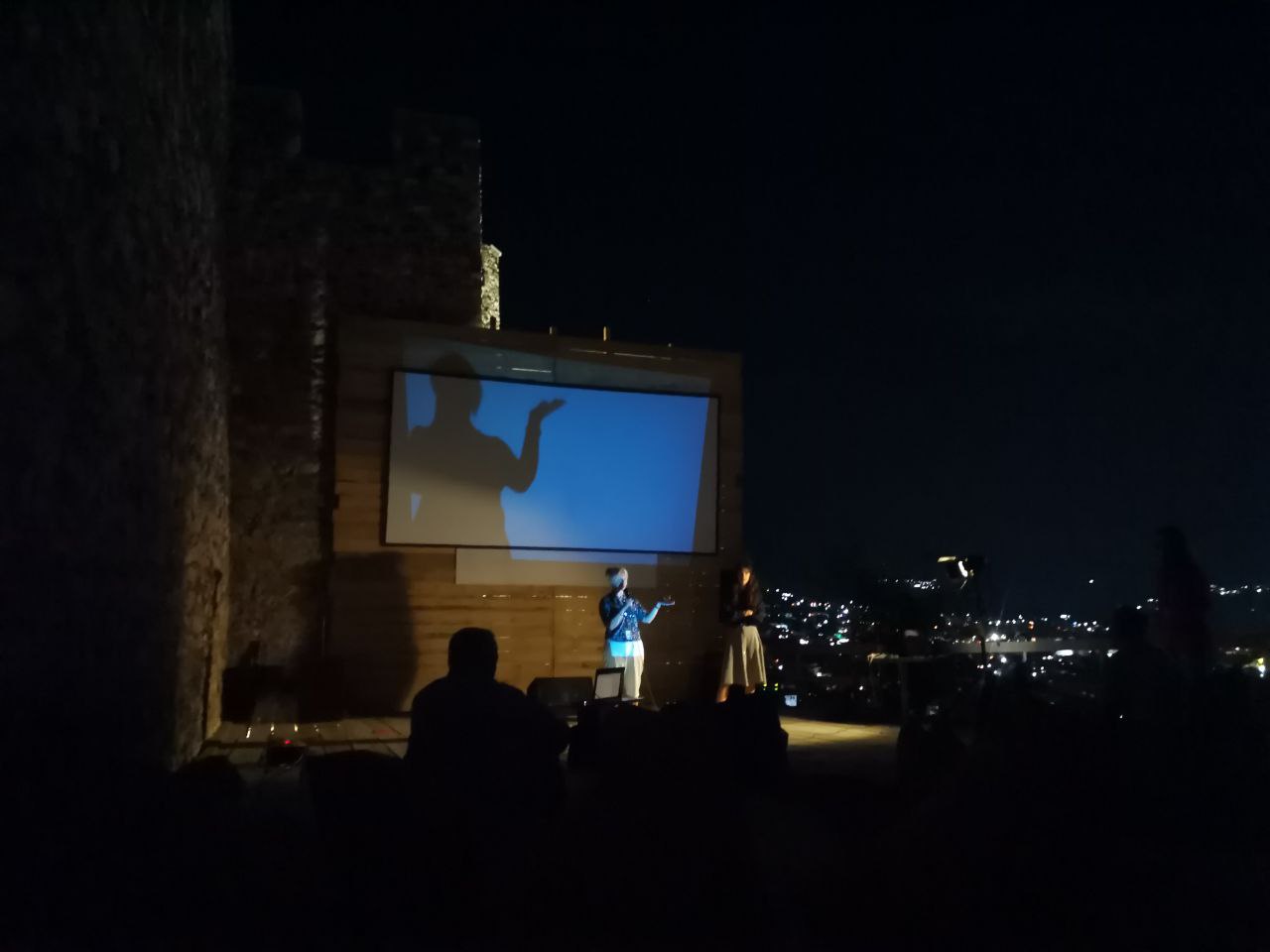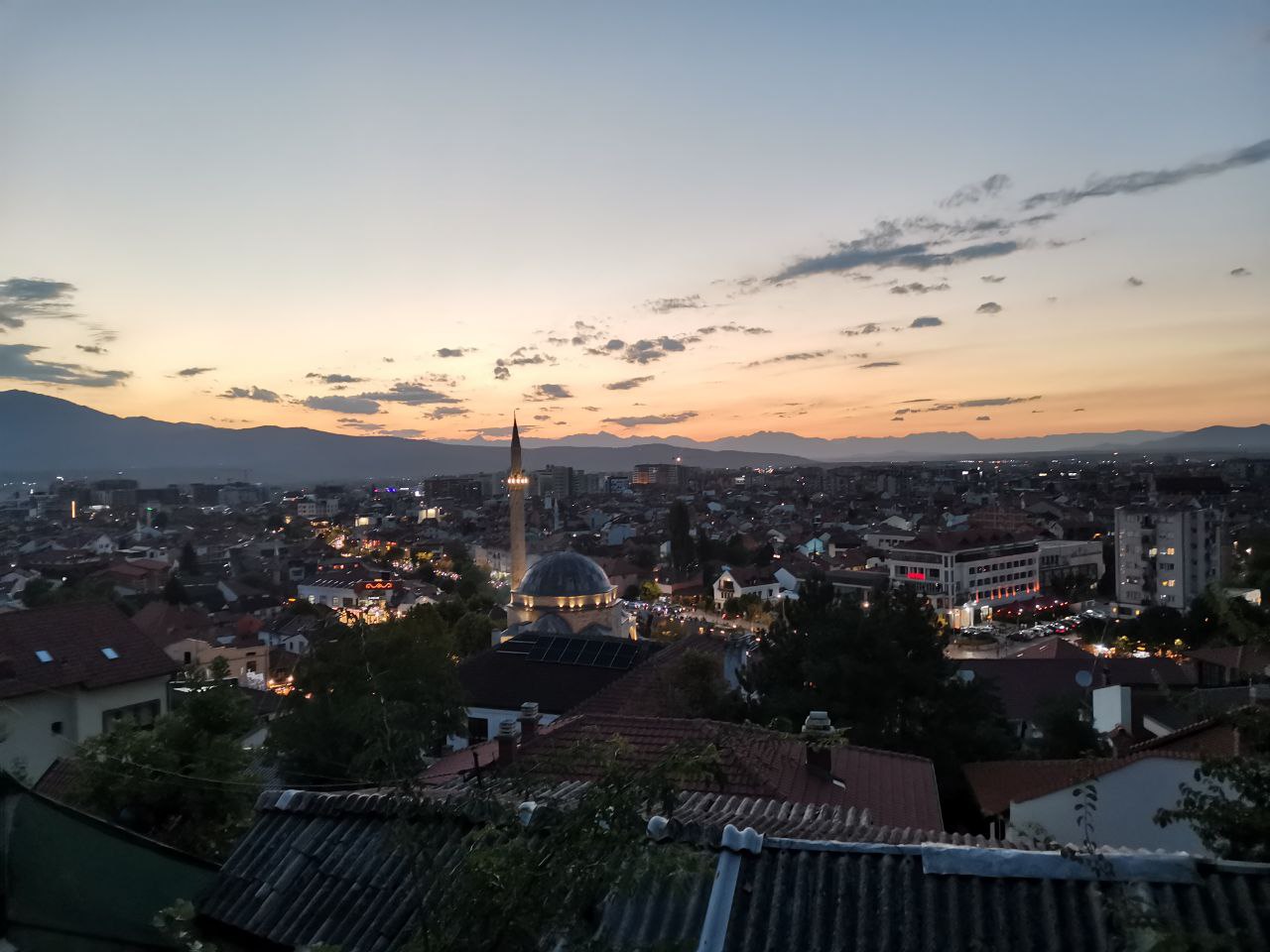
A Ukrainian delegation has visited the DokuFest film festival in Kosovo. Yulia Kovalenko, the programme director of the Docudays UA film festival, who was a member of the group, describes her impressions of the country and its picturesque city of Prizren, reflects on the (dis)similarity of Kosovo’s and Ukraine’s experiences, and outlines new, well-considered boundaries for the concepts of “justice” and “responsibility”.
It's somewhat strange to realise that the Yugoslav Wars lasted as long as the Russia-Ukraine war has lasted up to now. Back then, I received information about them mostly from television news — being still a schoolgirl and knowing about the former Yugoslavia only from my parents' stories: that it was almost the same as the Soviet Union, but in the Balkans, that it was a very beautiful corner of Europe, and that the things there were of much higher quality than in the former USSR. Later, stable internet access entered my life, and with it I was introduced to numerous articles about those wars. The NATO bombing of Serbia, which took place without a UN mandate but effectively ended the Yugoslav Wars (there's something symptomatic about this enduring tradition of naming a whole series of wars for independence from an empire after that very empire), provoked a reaction, at least in my family’s circle, which few could precisely articulate at the time, but which I would now describe as a mixture of a sense of justice and fear of the unknown. Because the only thing that was clear was that Europe would definitely change (spoiler: it seems we were wrong). Later, I read many analytical texts about those bombings and found a formulation that still seems the most accurate to me. Its author was Václav Havel, who believed that by daring to bomb Serbia without a UN resolution, NATO gave "human rights precedence over the rights of states. (...) But the Alliance has not acted out of licence, aggressiveness or disrespect for international law. On the contrary, it has acted out of respect for the law, for the law that ranks higher than the protection of the sovereignty of states. It has acted out of respect for the rights of humanity, as they are articulated by our conscience as well as by other instruments of international law.”
Later, as I began working with film, my knowledge from texts gained visual counterparts, some of which are truly hair-raising. From Vladimir Tomić's Flotel Europa, which participated in Docudays UA in 2016, or Jan Baumgartner's DNA of Dignity in this year's main thematic program of our festival, to Kumjana Novakova's Silence of Reason, which won the main Human Rights Award at this year's DokuFest in Kosovo. These are just a few quick mentions. In reality, almost every time I attend an international festival, I encounter colleagues or filmmakers who, for example, personally experienced the nearly four-year siege of Sarajevo by Serbian forces and (drumroll) Russian "volunteer soldiers." Or who are from Kosovo themselves. Or who are Serbs that focus on working with their fellow citizens, tirelessly driving home what this Serbian aggression was and what the Russian war against Ukraine is. Jumping ahead: personally, I think this important work has not yet yielded the desired results — but at least it is happening.

A panel discussion involving the Ukrainian filmmaker Oksana Karpovych (Intercepted) and Valentyna Humenna, an archivist of the Ukraine War Archive
However, I would not be completely honest if I said that panel discussions are the primary place where candid conversations on such complex topics occur. All these discussions continued throughout the entire festival week in private conversations. Some might call this pessimism — but I call it realism: in most cases, these discussions reached a common denominator: we are anticipating a war that would be even larger in territory. And festivals, cultural events, or initiatives cannot stop this deluge, but they can bring the issues of responsibility and memory back to the table. This conclusion (which I personally agree with) is rooted in the idea that you can't teach anyone anything, you can only inspire a person and support them in their willingness to learn. I believe that in this context, cinema is a powerful tool.
From the vast array of texts, films, and news I've absorbed up to today, Kosovo has formed in my mind as the image of a small country from which Milosevic's neo-fascist rise began, because the first thing he did upon coming to power in 1989 was revoke Kosovo's autonomy. At that time, Kosovo was an autonomous province with its own constitution and, within Yugoslavia, had almost equal rights with the other republics of this empire. In particular, Kosovo could veto decisions made by the President of the SFRY. It's also the image of a small country against which Yugoslavia essentially crashed and shattered, as NATO forces dared to undertake a military operation against Serbia in 1999 specifically to defend Kosovo from ethnic cleansing, influenced, among other things, by the mass killings of Kosovar Albanians in the village of Račak on 15 January 1999. Back then, during just six hours, Serbian armed forces very brutally killed 45 residents, including a woman and a child. I don't know about you, but to me, this parable bears a distant resemblance to something — and its beginning happened, at the very least, with Putin's Munich speech in 2007.
As we were preparing this project, we encountered (no point in hiding it) a few delays—right at that time, Ukraine was experiencing massive blackouts and, as a result, internet disruptions. And every time we explained to our Kosovar colleagues the reasons for our delays, their response was, "Don't worry, we completely understand, we've also had experience living with generators." At that moment, I didn’t fully grasp the significance of the remark about generators — until we arrived in Prizren and saw how deeply generators had become entrenched in Kosovo’s daily life. The fact is that Kosovo is enduring a severe energy crisis, caused by a combination of circumstances: domestic electricity production is almost entirely dependent on finite coal resources and outdated coal-fired power plants that regularly require maintenance; the price of importing electricity is too high for the country; and, of course, the is the still-unresolved conflict with Serbia, which currently manifests, in particular, in regulatory and legal difficulties for Kosovars in conducting foreign economic activities. More than 20 years after the war. No direct parallels here — except for the sad conclusion that, in one way or another, the war will haunt us as well for a long time to come. I hope that for just as long, we will remember who started it (for those who, by some magic, still haven't figured it out, the answer is that Russia started it in 2014, by militarily seizing Crimea and starting the war in Ukraine's eastern regions).

A screening of A Bit of a Stranger with the director Svitlana Lishchynska as a guest
However, this situation with the power didn’t hinder the festival events: generators powered an entire separate concert program, screenings took place both in indoor cinemas and outdoors, and for some screenings, the organisers built special locations, such as an open-air cinema in an ancient Byzantine fortress towering over the city on a hilltop, offering a breathtaking view on the way to the movies. It’s also worth noting that Prizren is the second-largest city in Kosovo after the capital, Pristina. However, it’s a relatively compact town with a population of just under 150,000, according to the latest data. Historically, Prizren has played a role as a cultural and political centre for the entire region and is now officially recognised by law as the country’s historical capital. The city is filled with ancient architectural landmarks, not to mention the breathtaking scenery. All of this naturally contributes to the fact that Prizren resembles Odesa in the summer before the full-scale phase of the war: streets are crowded with tourists, traffic jams are constant due to the number of cars, and all the hotels in the city are completely booked. This becomes an additional headache for the DokuFest team, as in addition to the tourist influx, they somehow need to accommodate at least 200, if not 250, guests in a city where there is no more available space. For the Ukrainian delegation, for example, the festival organisers arranged with a small hotel, which hadn’t yet opened due to ongoing renovations, to open its doors exclusively for us. Every morning, we had a free wake-up service in the form of construction workers who spent the entire week digging and filling in something on the road near the hotel entrance. Overall, I noticed a lot of construction and renovation work around the city. Considering the 35-degree heat, it’s impressive.
The streets were bustling with tourists speaking Albanian, German, Italian, English. The driver who picked us up from Pristina airport and drove us to Prizren mentioned that a significant portion of this influx of visitors were Albanians and Kosovars themselves, who had fled the war to other countries, assimilated there, and were now returning to their homeland with their families, even if for such a brief say. This reminded me of Mykolaichuk's film Such Warm, Such Late Autumn, in which those who had once been forced to leave Ukraine returned, now as tourists. How many of those who left Ukraine in 2022 will return home to live, and how many will come back as part of the tourist flow, is a deeply painful and open question.

Prizren in the evening
In addition to its ancient architecture, the entire city of Prizren is filled with modern monuments dedicated to their national heroes who died during the war. Young people aged 23, 24, 30, who could have become financiers, artists, logisticians — anything they wanted. On the very first day of our programme, our colleagues from DokuFest gave us a small tour of the festival locations, and in one of them, there was a book stand. Among all the books, the most attention-grabbing was a thick orange volume titled Once Upon a Time and Never Again. The title simultaneously evokes the beginning of a fairy tale and the most deceptive pseudo-pacifist mantra of the 20th and 21st centuries. This publication is dedicated to the children who died in Kosovo during the war in 1998–1999. Inside, besides the history and artefacts, is a dry list of the names of 1,133 children whose lives were cut short due to the empire's appetites. For the demographic prospects of such a small country, these are catastrophic numbers. Although I’m writing the word "numbers" now, and I am feeling all its cynicism. Because this is about tragedies in each of these families and the destruction of the future. Unfortunately, Ukrainians know firsthand what this means. According to data released by the Office of the Prosecutor General, as of the end of June 2024, 554 children have died as a result of the full-scale Russia-Ukraine war — that is, since 2022. And we still don't know exactly how many children the Russians have kidnapped and how many they have killed in the occupied territories. Frankly speaking, on this fact, on this repetition of violence against children, all the knowledge in the world proves useless. What is the point of it all if the worst continues to happen? Powerlessness, I think, is the most painful symptom of our time.
I’ve saved one story for the end of this text. Some of our delegates — members of the Mission 200 film crew — decided to drive from Ukraine to Kosovo by car. It might seem like a bold plan with two days on the road, if you didn’t know that other routes involving buses, trains, and planes hardly take any less time. The film's representatives — producer Natalia Yakovleva, protagonist Tetyana Pototska, and volunteer Nina Hapych — planned their route to Kosovo through Serbia. And during their stop in Serbia, someone, seeing the Ukrainian licence plates, drew "Glory to Russia" with a finger on their car. Later, we joked with the women that the person who did this was lucky not to be caught in the act (it’s entirely possible that it was a Russian who found a welcoming refuge in friendly Serbia and now shares their pride in Russia with everyone at a distance from Russia).
But if we set aside the jokes, the sad conclusion is that the unconsidered ghosts of the Yugoslav wars still eagerly embrace Russian propaganda and its vile imperial appetites. Let’s recall how in 2023, Serbian right-wing activists disrupted a screening of 20 Days in Mariupol, organised by Beldocs during their travelling festival. The alarmed Serbian "patriots" saw the film as "anti-Russian propaganda." This brings me back to the question of the role of cultural events today, which we discussed a lot in Prizren. Is there practical sense in conducting educational (whatever that mysterious word means) cultural-diplomatic work among people who already react this way to a Ukrainian car or use the term "anti-Russian propaganda" in 2023? This is a question for discussion. I’ll only say that from my personal perspective, the 20 years since the end of the Yugoslav wars is sufficient time for cultural figures within Serbia itself to have done the homework in recognising guilt and responsibility, as well as countering propaganda that largely echoes Russian narratives. Not that nothing has been done in this direction—for example, our colleagues at the Serbian festival Beldocs have consistently made efforts for many years both to address responsibility for the Yugoslav wars and to combat pro-government and pro-Russian propaganda. However, if the results of this work are not as tangible as the situation demands, perhaps economic sanctions should also come into play already. After all, hesitation is Europe's most vulnerable point. In the volumes of texts I once read about the Yugoslav wars, Milošević used to be described as a kind of product of Europe — due to its tendency to procrastinate and thus give dictators more time to carry out their vile plans of realising their populations' imperial fantasies. Clearly, the same thing happened with Putin.
Undoubtedly, it makes no sense to claim that Ukraine and Kosovo have identical problems, because it is not the case. And any parallels here, even if we draw them, require many clarifications and contextualisations. In this text — as well as during our program at DokuFest — I was more focused on those tendencies and experiences that are clearly resonant and, in some cases, simply needed no lengthy explanations either from us or from the Kosovars. Primarily, this concerns the experience of struggling against an empire and the genuinely difficult experience of fighting for something resembling justice and responsibility in times when both of these words could easily be placed in the same category as "unicorns" and "elves."
And finally, since I've already brought up these two fairy tale characters, justice and responsibility, I also can't ignore the elephant in the room. Ukraine still does not recognise Kosovo's independence. If you google it, you'll see that public discussions on this topic have been quite active, especially over the past two years. In 2022, representatives of the Servant of the People party responded to questions about why we still haven't recognized Kosovo by citing concerns about being accused of inconsistency in our international policy. To put it in a somewhat simplified way, there's a fear that this could be used as a pretext for the international community to recognise the annexation of Crimea. Neither I nor anyone in our delegation to Kosovo are diplomats. So here, I can only put on the hat of an armchair expert and someone who feels a deep sense of shame about this situation. What I can appeal to, aside from the fact that Crimea and Kosovo are entirely different stories that cannot be compared in any way whatsoever, is the point made by Václav Havel, which I referenced in the beginning. According to this view, there are situations where international law, due to various factors, is incapable of protecting human rights, and in such cases, we should be guided by common sense and the principle of human rights as the highest value.
1 — Debates of the Senate (Hansard). 1st Session, 36th Parliament, Volume 137, Issue 134. Thursday, April 29, 1999. Senate of Canada. Accessed at: https://sencanada.ca/en/content/sen/chamber/361/debates/134db_1999-04-29-e#0.2.X57BJ2.NBLOSJ.A6YZAF.V2.
The Focus Ukraine project is implemented by DokuFest Kosovo and Docudays UA with the support of IZOLYATSIA Foundation, Trans Europe Halles and Malý Berlín and co-financed by the ZMINA: Rebuilding programme, created with the support of the European Union under a dedicated call for proposals to support Ukrainian displaced people and the Ukrainian cultural and creative sectors.
Photo credit: Yulia Kovalenko
Header photo:
Docudays UA delegates at the DokuFest film festival: filmmaker Karolina Uskakovych, programmer Polina Yakovleva, fundraiser Anastasia Humeniuk, programme director Yulia Kovalenko at the photo exhibition titled UA_24022022.JPG (stand by author Mykhailo Palinchak)